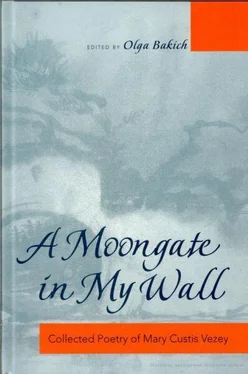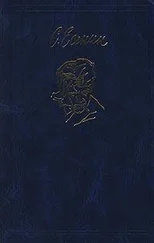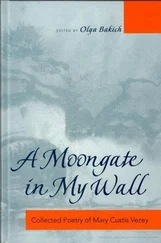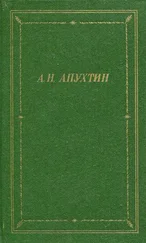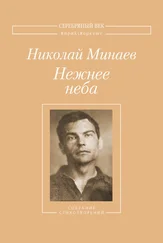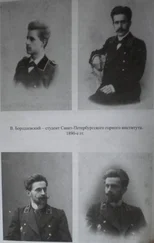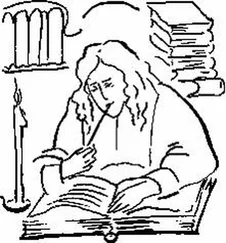Dear dream forgotten, dream that was so frail!
The evening sky was cloudless, calm and pale —
could I have guessed, as we resumed that trail,
that every star would wane, and every stream
run dry and silent, as in a by-gone dream?
23 Feb. 1936
Star as you fell through the blue evening air
when I stood watching you, silent and thrilled,
I was supposed to have breathed a word of prayer
that some deep wish I had might be fulfilled.
But, star, oh, — white, round star, — I saw you fall,
breathlessly saw the light behind you trailed,
and I forgot the earth I trod, and all
earthly desires and wishes, — and I failed…
Bitter my sorrow now, and sore regret
not to have grasped the chance the day it came!
But such was your swift sudden spell, that yet
if others fell — I still would do the same!
Shanghai, [1936]
520. «I'm often dreaming…»
I'm often dreaming
that I unfurl
my tall wings, gleaming
like mother-of-pearl,
and cut my tether,
and take to flight,
with each small feather
glistening white;
but, oh, I waken,
and, to atone,
breathless and shaken
fall, like a stone,
and see — a token
of earthly things —
they're broken —
my shining wings!
[1936]
521. «I am a stranger here. Leave me alone…» [233] Variant in the fourth line of the first stanza in the manuscript: «and hill and meadows from my solitudes.» The manuscript indicates that Mary Vezey planned to include another stanza between the first and the second stanzas; only one line was written in brackets: «In our tall forests we had stately firs.»
I am a stranger here. Leave me alone.
My eyes are tired of your streets of stone,
your tower houses; I am used to wood
and hill and meadows and to solitude.
All now is ended — all the wild birds flown,
and stars burnt out which had so brightly shone —
all the tall stately firs stand bare and dead
and silent lies each empty riverbed.
Only the still brown rocks, moss-covered, keep
their watch where silver wavelets curl and creep,
and that same sky, sunless and cold and grey,
hangs, — as the morning when I sailed away.
Shanghai, 1936–1937
522. «I hope from where you sit or lie…» [234] The Norma Jean to whom this poem is dedicated has not been identified; perhaps it was Marilyn Monroe, whose real name was Norma Jeane Morrison.
I hope from where you sit or lie
that you can see a patch of sky
at night, with angels flitting by,
each lighter than a sigh.
I hope that thru your window pane
you see trees, dripping in the rain,
or stooping low as under strain
where heavy snow has lain.
That you can watch a billowy cloud
sailing, like some white galleon proud,
and birds around it, crying loud,
ever a joyous crowd;
I hope that you may never tire
of watching sunlit skies on fire.
27 Nov. 1951
523 Nocturne(«White clouds…») [235] Variant in the last stanza in the manuscript: «But in her tower / high-walled, / the knight's young daughter /enthralled /forgetful of the hour/ silently watches/ the silver splotches / upon the water.»
White clouds
Remote
Like little explosions
Climb the sky and float
Above the black erosions
Of the castle moat.
Behind the grey parallelogram
Of his castle wall
The aged knight
Snores, for he doesn't really give a damn
At all
For the beauty of the night.
But in her tower
The knight's young daughter
Forgetful of the hour,
Silently watches
The silver splotches
Upon the water.
29 Mar. 1955
524. Impressions at the Opera (a true story)
Three dowagers with silver tresses
and silver foxes over pale-blue dresses
floated into their box,
fox after fox,
and settled down,
like pillows stuffed with eiderdown.
And Salvatore Baccaloni,
as Bartolo up on the stage,
though usually quite the rage,
seemed not as fat,
nor half as funny.
21 Feb. 1956
525. «It is usually very still on that day…»
It is usually very still on that day,
which comes at different times in different places;
came in the end of October in the place where I lived.
Very still and cold, and then, toward evening,
the air is suddenly warmer.
Nature stands still, you can hear the earth breathe,
the trees reach out and wait.
Stars that had been very brilliant
all at once turn opaque.
It is then that the first snowflake of the winter, always
large and slow, is wafted, like a small parachute, down
upon the expectant earth,
in hushed silence.
27 Feb. 1956
526. «With folded wings he sat and took a rest…»
With folded wings he sat and took a rest
upon a branch not far from where his nest
was hidden in the thicket from sharp eyes
and sharper claw and long,
deep in a wood of aspen and of beech
where sunrays rarely reach,
where stillness lies
and shadows hang.
Quietly he sat, small, gray and soft,
colorless lump of life, alone, aloft,
seen and admired by no one.
Then he spread
his wings,
most powerful among such minute things,
and, gray no more
but golden in the sun, he rose to soar,
and then he sang…
February 1956
527. «Nothing is left to write of any more…» [236] Po Chii-i: Bo Juyi in contemporary transcription (772–846), a Chinese poet of the Tang dynasty
Nothing is left to write of any more,
all that there is to say was said before:
all is recorded — every human breath.
The poets have discussed God, love and death,
the seasons and the land and water here,
cities around us, and the atmosphere,
creatures from the amoeba to the auk,
including beings that can sing and talk.
All you need do is listen, gratefully,
to Swinburne, or Verlaine, or Po Chu-i.
7 Mar. 1956
528. Nocturne («Late twilight in October…»)
Late twilight in October.
Stillness hangs
above primeval marshes like spun glass.
Escaping lightly from the reaching arms
of scrawny birch, the moon,
opaque and naked,
drops her seventh mist.
No rustle stirs
the elderberries. Sorrowful, a loon
raises his pointed head among the blades
of marsh grass; even he does not invade
the silence with habitual complaint.
Читать дальше
